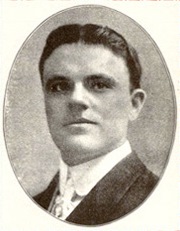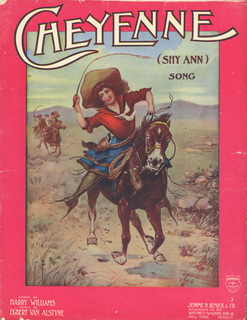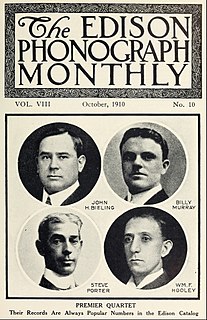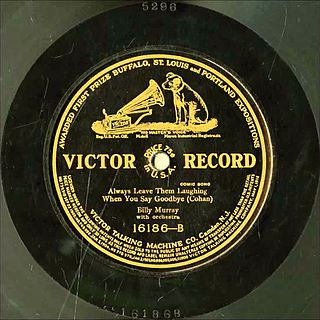Related Research Articles
"Take Me Out to the Ball Game" is a 1908 Tin Pan Alley song by Jack Norworth and Albert Von Tilzer which has become the unofficial anthem of North American baseball, although neither of its authors had attended a game prior to writing the song. The song's chorus is traditionally sung as part of the seventh-inning stretch of a baseball game. Fans are generally encouraged to sing along, and at some ballparks, the words "home team" are replaced with the team name.
The Haydn Quartet, later known as the Hayden Quartet, was one of the most popular recording close harmony quartets in the early twentieth century. It was originally formed in 1896 as the Edison Quartet to record for Edison Records; it took its new name when recording for other companies. The name was a homage to Joseph Haydn, the classical composer; the spelling was later revised to Hayden, which reflects the way it was pronounced. The group disbanded in 1914.

William Thomas Murray was one of the most popular singers in the United States in the early 20th century. While he received star billing in vaudeville, he was best known for his prolific work in the recording studio, making records for almost every record label of the era.

"Cheyenne" is a popular and sentimental song written in 1906, with words by Harry Williams and music by Egbert Van Alstyne. It became a hit for a number of artists. The chorus is:
"Play a Simple Melody" is a song from the 1914 musical, Watch Your Step, words and music by Irving Berlin. The show was the first stage musical that Berlin wrote. It ran for 175 performances at the New Amsterdam Theater in New York City. The one song from it that is well-remembered today is "Play a Simple Melody," one of the few true examples of counterpoint in American popular music — a melody running against a second melody, each with independent lyrics. Two other of Berlin's so-called "double" songs are "You're Just in Love," and "An Old-Fashioned Wedding".

"Under the Anheuser Bush" is a beer garden song commissioned by the Anheuser-Busch brewing company in 1903. With music by Harry Von Tilzer and words by Andrew B. Sterling, the title contains a pun on the surnames of the company's founders.

The American Quartet was a four-member vocal group that recorded for various companies in the United States between 1899 and 1925. The membership varied over the years, but the most famous line-up — comprising John Bieling, Billy Murray, Steve Porter (baritone), and William F. Hooley (bass) — recorded for the Victor Talking Machine Company from 1909 to 1913. The same group of singers also recorded for Edison Records as the Premier Quartet, and for that and other labels as the Premier American Quartet. From 1912 to 1914 the quartet also recorded with countertenor Will Oakland as the Heidelberg Quintet.
"He May Be Old, But He's Got Young Ideas" was a popular song, originally published in 1916. It was written by Howard Johnson, Alex Gerber and Harry Jentes. It was published as sheet music and was recorded by several popular singers. Today, the most famous version is a 1916 version by Billy Murray, whose version has entered the public domain.
"Good Evening, Caroline" is a 1908 popular song, written by Albert Von Tilzer and Jack Norworth. The singer Billy Murray made at least two recordings of the song: one from 1908 on Edison Records, and one in 1909 on Indestructible Record Company. The 1909 recording became one of the most popular recordings of its year. Murray's versions are the most commonly heard today.

"Ain't It Funny What a Difference Just a Few Hours Make" is a popular song, introduced in the 1904 Broadway show The Yankee Consul, and briefly becoming a standard.
"He Goes to Church on Sunday" is a popular song published in 1907 with lyrics by Vincent Bryan and music by E. Ray Goetz. It was first introduced by Eddie Foy in the Broadway production of the musical comedy The Orchid. The song tells the stories of men who defraud people, but are considered honest because they go to church on Sundays. However, the song doesn't appear to be a criticism of religion, and the tone of the song is humorous and light-hearted.
I'm Afraid to Come Home in the Dark is popular song, written by Egbert Van Alstyne and Harry Williams in 1907, and made famous by Billy Murray. Today it is popular among collectors of cylinder recordings. Billy Murray recorded the song on several record labels, including Edison Records in 1908. This version is now in the public domain.

"In the Land of the Buffalo" is a popular song, first published in 1907. The chorus:
"Any Little Girl, That's a Nice Little Girl, Is the Right Little Girl for Me" is a popular song, first published in 1910, and written by Thomas J. Gray and Fred Fisher. Although largely forgotten today, a 1911 recording of the song by Billy Murray on Zon-O-Phone Records survives, and is widely accessible because the recording has entered the public domain. It was also featured in a Max Fleischer "Follow the Bouncing Ball" sing-a-long animated cartoon in the early 1930s. The song appears on the soundtrack of the 1933 film Stage Mother. Subsequently, in 1938 it was recorded for Bluebird Records by Shep Fields and his orchestra, with the accordionist John Serry Sr.

"Always Leave Them Laughing When You Say Goodbye" was a popular song, first published in 1904, and written by George M. Cohan. Today, the best known recording of the song is by Billy Murray, which was recorded in 1907 with Victor Records, and whose version has entered the public domain. Although very popular in the early 20th century, the song is almost completely forgotten today.
"Because I'm Married Now" was a popular song, first published in 1907, and written by Herbert Ingraham. Singer Billy Murray recorded at least two versions in 1907, one for Edison Records and another for Manhattan Records.

Ernest George Pike was an English tenor of the early 20th century. After studying at the Guildhall School of Music in London, he worked as a bank clerk and sang as a church tenor before making his first recording "Take a Pair of Sparkling Eyes" for the Gramophone & Typewriter Company in 1904. He became the house tenor for HMV and made several hundred records in a career that spanned over twenty years.
"Cordelia Malone" is a novelty song written in 1904 by Billy Jerome and Jean Schwartz, and recorded that same year by popular Irish American singer Billy Murray.

John H. Bieling was an American tenor singer who was a pioneer recording artist in the early years of the twentieth century. He featured on thousands of recordings, especially as a member of The Haydn Quartet and The American Quartet, two of the most popular vocal groups of the period.

Samuel Holland Rous, who recorded using the name S. H. Dudley, and less frequently as Frank Kernell, was an American singer, pioneer recording artist, and music business executive. He was unrelated to the black vaudeville performer and impresario Sherman Houston Dudley.
References
- ↑ Browse All Recordings.Library of Congress.
- ↑ Frank W. Hoffmann; Dick Carty; Quentin Riggs (1 January 1997). Billy Murray: The Phonograph Industry's First Great Recording Artist. Scarecrow Press. ISBN 978-0-8108-3105-6.